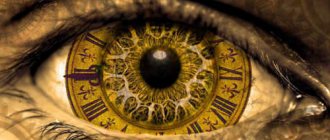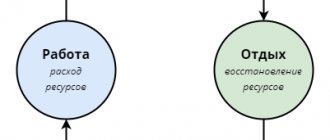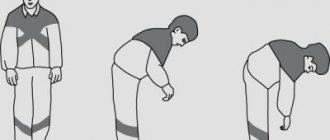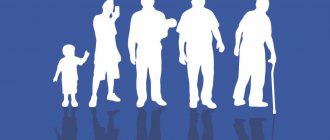Sometimes you get the feeling that the events that are happening have already happened . A person hears the same sounds, inhales smells, and predicts what the interlocutor will say. Consciousness throws up pictures of what is happening, but does not answer the question of when such an event occurred. This means that this is a deja vu phenomenon , and it occurs during life in 97% of the population. Particularly surprising are situations when, when we see a stranger and when visiting a new room, we can describe in detail facial features or furnishings. It becomes creepy and a little uncomfortable. Don’t even try to remember when familiar events happened, it’s impossible. Why does the feeling of déjà vu occur ?
From the history of studying the deja vu effect
In ancient times, when humanity did not have sufficient knowledge and scientific tools to study the world around us, all obscure situations were explained from the perspective of the influence of something supernatural. Thus, the deja vu effect was attributed to the functions of “memories of the past” and “prediction of the future.” There have been suggestions that the soul of a person can travel separately from the body, for example, in a dream, and then the person is able to recognize the place that his soul previously visited.
The term “déjà vu” was first proposed by the French philosopher Emile Boirac in 1876 (by the way, Emile Boirac is also known as the popularizer of the Esperanto language). Later, differentiated names for manifestations of the déjà vu effect appeared: déjà senti for feelings felt as already experienced, déjà vecu for situations felt as having happened before, and déjà visité for places felt as previously visited. This enrichment of scientific vocabulary and terminology caused a surge of interest in the topic and new attempts to explain this phenomenon.
Hypotheses for the causes of the déjà vu effect that arose in the 19th century:
- In 1878, in a German periodical on psychology, a group of psychologists put forward a version that fatigue could be the cause of déjà vu. A tired brain may have poor spatial orientation and inadequate perception and assessment of the environment.
- In 1884, a group of scientists accepted the possibility that different hemispheres of the brain could process information from the same object at different speeds. Therefore, when the “slower” hemisphere finishes processing the data, the “faster” one already identifies the picture or situation as previously seen or experienced.
- In 1889, the American scientist William H. Burnham, known for his work on the properties of human memory, hypothesized that only a well-rested brain is susceptible to the déjà vu effect. In a rested state, the brain is able to grasp even non-obvious analogies of the new with past experience and draw non-trivial conclusions.
- In 1895, British philosopher and poet Frederick Myers suggested that the subconscious mind is capable of processing information faster than the conscious mind, so the conscious mind can perceive information processed by the subconscious mind a second earlier as long ago known. However, consciousness cannot determine how long this information has been known so quickly.
- In 1896, the American scientist Arthur Allin put forward several hypotheses. According to the first, déjà vu may be the result of forgotten dreams. According to another version, déjà vu can appear as a result of a short-term loss of concentration at the moment when a person is thinking about a new thought. Then the dream or thought “comes true” in the format of deja vu, i.e. what is seen in a dream or imagined seems to have been previously seen in real life.
The phenomenon of déjà vu was studied by many eminent scientists of the 20th century. Thus, Sigmund Freud explained déjà vu as the work of the subconscious, which in such an unusual way signals secret fantasies and desires that did not come true and were forgotten over time.
Carl Gustav Jung, as a specialist in the field of the collective unconscious, believed that déjà vu is a kind of “ancestral memory” or “memory of a past life” and the result of reincarnation. With the development of science, more clear explanations of the déjà vu effect have appeared, which can be retested in laboratory conditions. However, first things first.
Deja vu: what does this mean according to scientists?
Researchers have not learned how to artificially cause the phenomenon. Therefore, take the facts presented below as a theory based on a survey of people who experienced déjà vu. Why and what causes déjà vu syndrome according to scientists?
Many scientists believe that déjà vu occurs due to the layering of similar situations
- Layering of situations . The theory was put forward by Andrey Kurgan. A modern author in the book “The Deja Vu Phenomenon” argues that the main reason for the phenomenon is the layering of similar situations. Moreover, one of them is recorded in the past, and the other occurs in the present. Deja vu happens under special circumstances. There is a time shift. As a result, a person perceives the future as present events. There is a stretching of the future tense, the inclusion of past and present incidents. On the pages of the book you will find examples from life. Readers claim that the situations described completely coincide with the sensations that a person experiences when faced with déjà vu.
- Fast information processing . A rested person perceives what is happening better. An unloaded brain quickly processes the pictures it sees, the information it receives, and the words it hears. The theory comes from physiologist William H. Burnham. An American scientist claims that when seeing an unfamiliar object, the brain begins to process information, reading the smallest details. A rested brain center works quickly. A person perceives information processing differently. There is a feeling of repeating incidents.
- Recording events in the form of holograms . Herman Sno argued that memory is stored in the human brain in a special way. According to the scientist, events are recorded in the form of a three-dimensional image (hologram). Each piece of the picture includes enough data to reproduce the entire image. Clarity depends on the size of the picture. Déjà vu occurs as a result of an overlapping connection between the present and elements of the recorded past. The hologram evokes the whole picture, leaving a feeling of repeated incidents.
- Systematicity of memory . Some of the most recent research, conducted in the 90s, belongs to Pierre Glour. According to the neuropsychiatrist's hypothesis, a person records information through two processes: recognition and recovery. Déjà vu occurs due to a violation of the sequence. In such a situation, when the picture is changed, a person recognizes what is happening, but data recovery does not occur.
The puzzle with such a condition as deja vu has still not been solved.
Psychologist Sigmund Freud did not ignore the topic of deja vu. The Australian is confident that the phenomenon arises thanks to the human consciousness : it throws up subconscious pictures and fantasizes. The hypothesis was picked up by Freud's followers and brought to the theory of the struggle between “I” and “It”.
Types of deja vu
Deja century
(Déjà Vécu, i.e. already experienced) is what most people experience when they experience déjà vu. While déjà vu is the feeling that you have seen something before, déjà vu is the state that you have seen the event before, but in more detail, that you recognize the smells and sounds. This is often accompanied by a strong feeling that you know what will happen next.
Deja visit
(Déjà Visité, i.e. already visited) is a less common phenomenon, and in which an inexplicable knowledge of a new place arises. For example, you may know the route to a new city, despite the fact that you have never been there and know that you could not obtain this knowledge in any way. Deja visit concerns space and geography, while deja century is associated with temporary events.
Deja senti
(Déjà Senti, i.e. already felt) is the appearance of something that you have already felt. This is a mental phenomenon that rarely remains in memory. The memory is usually triggered by the sound of another person's voice, spoken thoughts, or reading. Unlike other types of déjà vu, with déjà senti there is no shadow of something paranormal or unnatural.
Jamevu
(Jamais Vu) is the opposite of déjà vu and describes a familiar situation that you do not recognize. The person does not recognize the situation, although he knows that he has been here before. You may suddenly not recognize another person, word, or place you know. In one study, researchers asked 92 volunteers to write the word “door” 30 times in 1 minute. As a result, 68 percent of participants experienced symptoms of jamevu, meaning they began to doubt that the word “door” was real. This may indicate that jamevu is a symptom of brain fatigue.
Presque
a feeling "on the tip of your tongue", that is, a strong feeling that you are about to experience an epiphany, although this rarely happens. The feeling of presquel can be very distracting and intrusive. A person often remembers one or more characteristics of a forgotten word, such as the first letter, but feels a slight anguish when searching for the word and a sense of relief when the word appears in the mind.
Staircase mind or staircase wit
(L'esprit de l'Escalier) is the state when you find a smart solution or answer when it is too late. This could be a retaliatory attack on an insult, a witty remark that comes to mind when it has already become useless. It's like you're "on the stairs leaving the stage." The German language uses the word "treppenwitz" which expresses the same idea, but in modern language it refers to events or facts that are contrary to their basis or context. In Russian the phrase “is strong in hindsight.”
"Wit on the Stairs"
A situation familiar to almost everyone: immediately after an important or too emotional conversation, successful objections come to mind that were not expressed in time (from the French l'esprit de l'escalier, “the spirit of the stairs”). At the same time, a person is usually annoyed at his own incompetence. In fact, cleverness has nothing to do with it. It’s just that an overexcited brain cannot immediately move on to solving new problems, but replays events that have already happened, going through possible options for their development.
The mechanism of déjà vu has not been fully studied, but it has been established that the condition does not have a direct connection with mental disorders, although it can occur with them. For most people, déjà vu occurs extremely rarely. Presumably, the likelihood of their occurrence increases with overwork or severe stress. In any case, there is no need to be afraid of deja vu. Only if conditions of this kind recur frequently and cause serious discomfort, does it make sense to consult a doctor.
Video from YouTube on the topic of the article:
Scientific concepts and explanations of the déjà vu effect
So, why can a person have the feeling that he has already been to this place and seen what is here, although he came here for the first time? Let's start with the fact that the person... could really see it!
Travelers and movie lovers experience déjà vu more often
Travelers and movie lovers experience déjà vu more often because their visual memory is more densely filled with visual images. We have seen the Egyptian pyramids and the sights of European cities countless times in the movies, so when you go on a tourist trip, it’s no wonder you get this very déjà vu effect on the very first excursion. The street layouts of cities in Mediterranean countries are very similar, so when you visit Italy, you will see a lot of similarities in Malta. The architecture of ancient standard structures, for example, amphitheaters, has minor regional differences in different countries. Therefore, having once seen an amphitheater in Greece and then in Cyprus, you may be at a loss as to how you know this place in Cyprus if this is your first time here.
Déjà vu occurs in people with poor memory or an inability to remember the entire situation
Déjà vu occurs in people who have poor memory or an inability to remember a whole situation because they may have seen something similar but cannot remember what it was. At different times, several experiments have been conducted that clearly prove that people often remember details well, but in general they do not remember the situation to which these details relate. However, having recognized a familiar detail or nuance of the situation, they transfer (extrapolate) this nuance or detail to the situation as a whole, believing that they have already “been here and already seen it all.”
Déjà vu may be associated with disorders of the temporal lobe of the brain
Déjà vu may be associated with disturbances in the temporal lobe of the brain, because it is this area of the brain, in tandem with the hippocampus, that is responsible for the formation of long-term memory and the processing of visual and auditory information. In this case, the correlation of the two types of data with long-term memory may be impaired. Moreover, it has been noted that people suffering from temporal lobe epilepsy often experience a déjà vu effect shortly before the next attack. In anticipation of an attack, the electrical activity of the temporal part of the brain increases above normal, and déjà vu becomes a kind of “light version” of a disorder of brain function.
Déjà vu may be associated with hippocampal dysfunction
Déjà vu may be associated with hippocampal dysfunction because the hippocampus is responsible for transferring information from short-term memory to long-term memory. This is a complex physiological process when, when perceiving and remembering new information, it is compared with what is already available in long-term memory deposits. Dissynchronization of processes and failure to compare new information from short-term memory with what has already been seen and stored in long-term memory can lead to the fact that the present is perceived as having happened before. This is how the deja vu effect occurs when the brain confuses the past and the present.
Error
Your brain just short-circuited. Something went wrong, the sensory input accidentally overloaded and messed up the memory. In other words, your mind is literally playing tricks on you.
Reminder
You remember something else. An object, smell or sound awakens a memory already stored in memory. It makes you feel like you've seen it/been there before, even though you haven't.
Memories, “sorted into shelves”
You will recognize a model, a pattern, that is familiar to you. The human mind has an amazing ability to create and remember patterns. Seeing how furniture is created, how a garden grows, and even a familiar voice can cause a déjà vu effect.
Alarm signal
If you have epilepsy, you should know that the feeling of déjà vu sometimes occurs before the epileptic activity in the temporal lobe of your brain is activated.
Too much outside information
Your brain is simply overloaded. When you first see something, a specific area in your temporal lobe is activated. When you see something that is already familiar to you, another area of the temporal lobe is activated. Both of these parts of the brain send information to the hippocampus. If they transmit signals at the same time, your brain may become overloaded. This causes confusion, and a familiar feeling is assigned to the new object.
"Folder" is mixed up
Your brain just “put” something in the wrong “folder”. It's like if you accidentally saved a picture to your documents folder. You just saw something new, so it should have been immediately stored in short-term memory, but the brain made a mistake and stored this information in a “folder” of long-term memory. This gives rise to a strange feeling that you are already familiar with what you saw/happened.
Excessive anxiety
Your anxiety level is too high. Conducting a study on one British man who was constantly in a state of déjà vu, scientists formulated a relatively new theory of the origin of this phenomenon. The subject felt that everything was familiar to him - even television shows and new stories. Scientists believe that such feelings may be caused by excessive anxiety.
Communication problems
The two halves of your brain are like a typical couple: sometimes they don't hear each other. Some scientists explain it this way: while your brain transfers information from one part to another, there is a delay. The feeling of déjà vu can occur when one half of your brain receives the same information twice, first directly from a stimulus and then again from the other half of the brain.
False memories
People with schizophrenia experience what are called false memories - sensations or feelings that they have done something that they have never actually done before. This state is similar to déjà vu, and for this reason it is often mistaken for déjà vu.
Distracted attention
In an attempt to create a model of déjà vu, scientists developed the cell phone theory, which is also known as distracted attention. Here's the point: your subconscious mind is collecting information so quickly that your conscious mind doesn't know about it because your mind is distracted by something else. When, a second later, you fully focus your attention on what is around you, you will feel as if you have already seen it all - because you have.
Causes
Today no one can say for sure about the psychophysiological causes of déjà vu. But it is known that it is more typical for especially impressionable people, teenagers, and melancholic people. It also more often manifests itself in a state of stress or fatigue. Here are some of the likely causes of déjà vu:
We save space in the house: we store our shoes on trempels (Brazilian way)
Protsenko admitted that during the year of fighting COVID he hardly saw his parents
You just need patience and a few berries: how to grow blueberries from store-bought fruits
- A memory error that occurs during overload, when a person gets tired, and the brain takes for what is known what is actually unfamiliar.
- Accelerated information processing, which, according to the opposite version, occurs when the brain is well rested and processes information very quickly. It seems to a person that what happened a second ago happened a long time ago.
- Similarity of situations. The brain compares memories by recognizing similar pictures.
- Confusion with files. According to this theory, the brain confuses long-term and short-term memory. Instead of putting what you just saw into a short-term memory “file,” the brain tries to put it into long-term memory. This creates the feeling of something seen a long time ago, although it happened a second ago.
- Hologram theory. This concept suggests that our memory is characterized by the formation of three-dimensional images. Following one element, for example, a smell or taste, the entire “hologram” stretches, that is, a chain of memories. The brain’s attempt to restore this “hologram” is deja vu.
In total, there are more than forty hypotheses, including, for example, the theory of parallel reality and reincarnation.
The mechanism of occurrence of the mysterious phenomenon of perception
Although the deja vu effect has been known since time immemorial (it was described and studied by ancient Greek philosophers), the concept itself appeared only at the end of the 19th century. It was introduced by the French psychologist Emile Boirac. He explored a whole complex of phenomena associated with associations and “strange sensations” of what he had previously experienced, seen, and heard.
Modern scientists, using the latest methods for studying brain activity, have advanced somewhat further. They determined that déjà vu originates in the hippocampus, the temporal lobe of the brain.
It is here that the zone is located in which the comparison of already known and new information takes place. Thanks to this, a person understands what is common between them and what is different.
If the hippocampus malfunctions, the images do not undergo analytical processing. They immediately fall into the memory center, and a request for comparison of information instantly arrives there. It turns out that the brain compares new information with the one it has received now, considering it to have been received earlier. Fresh impressions are layered on top of each other, and so you get the feeling that it all happened before.
The most common causes of hippocampal dysfunction
If we exclude diseases (epilepsy, schizophrenia and others), then the causes of the phenomenon may be as follows:
- Fatigue. Overexertion and lack of sleep can “disturb the settings” of the brain and cause a state of déjà vu.
- Stress. Mental stress, hypothermia, overheating - all this does not benefit the functioning of the brain.
- Depression. We are talking about clinical depression, and not just a state of blues.
- Pressure changes. As the body adapts to changes, short-term problems with the hippocampus may occur.
There is another interesting phenomenon that may be associated with the déjà vu effect. It was discovered by a group of scientists at the University of Colorado working in the team of psychologist Anne Cleary. It turns out that when a person sees something new and tries to answer the question of what it is, a burst of neural activity occurs in the temporal lobes of the brain. The subjects admitted that they wanted to name the phenomenon incorrectly because they had associations with what they had seen before.
Well this one, what's his name
If previous distortions of memory and consciousness among healthy people are, fortunately, quite rare, then absolutely everyone experiences presquel - and, moreover, quite often.
This condition is partly related to the previous ones - it also refers to memory distortions, but has a slightly different nature. To give a simple definition, presquevue is that same feeling when you try to remember the name of a doctor’s instrument, which “well, this one, what’s his name, with an “he”, and then it turns out that it’s a phonendoscope - and there’s no letter “x” there even close No. The same thing with the name of “that actor who played the chubby guy in The Bachelor Party” and the breed of cats with short legs. It’s right on the tip of your tongue, but you can’t say it. Scientists explain this brain trick in different ways. Some argue that the correct word prevents us from naming another, incorrect, but retrieved from memory faster. This hypothesis was also supported by Sigmund Freud.
Another reason may be that the search for certain words and the images they evoke trigger a chain of disturbing memories and associations in our minds, which displace the desired word. This phenomenon was described by Jung, citing the example of a certain man who was reciting the poem “In the Wild North” and stumbled on the line “... and slumbers, swinging...”, unable to remember the next line: “... and she is covered with loose snow, like a robe.” . Jung told him this line and asked the man to describe the thoughts that “snow” and “robe” brought to him. The man gave out a whole chain of associations with his brother’s deceased friend, his late grandfather, problems with excess weight and his fears of sudden death.
By the way, with age, in some people, the amount of prescuevus increases sharply - but this is associated with direct physiological changes in the brain and memory impairment. But you can keep your brain in impeccable shape - our article will help you with this.
Interesting facts about time distortions in humans
The phenomenon of déjà vu is described not only in scientific literature:
- Chateaubriand, Charles Dickens, Leo Tolstoy, Marcel Proust and other writers mentioned déjà vu.
- There is a movie with the same name “Deja Vu”. The effect is also shown in the episodes of “The Matrix” and “Operation Y”.
- Madonna and Tina Turner spoke about the deja vu effect. And Sean Connery in this state decided that in a past life he was a healer in an African tribe.
The emotions that people experience during déjà vu are so strong that they are often associated with memories from a past life or the gift of foresight.
What is Presquevue?
This phenomenon illustrates that the meaning of a word can temporarily exist in consciousness without its sign form. Sometimes this phenomenon is designated by the term presque vu or presque vu (French presque vu “almost seen”), which was created by analogy with the terms deja vu and jamevu.
Interesting materials:
How to get through the Minotaur Maze in Minecraft? How to get through the maze in Lambert Tycon 2? How to transit to Domodedovo? How to get verified in Oriflame? How did Lake Titicaca come about? How to level up stealth by 100? How are classes carried out during correspondence courses? How does the administrative process work? How is confession carried out in an Orthodox church? How is the interview at MFC?
The main thing about the features and mechanism of the deja vu effect
If you have experienced a very realistic feeling that what is happening to you has happened before, do not be alarmed. There is nothing wrong with the deja vu effect. Almost all people on the planet experience this condition. Remember, that:
- Frequent instances of “falling out of reality” can be an alarming symptom, but if this happens rarely, there is no cause for concern.
- The phenomenon of déjà vu is most typical for people aged about 17 and 35-40 years.
- A malfunction of the hippocampus can occur due to fatigue, stress, or changes in pressure.
Although mystical reasons are attributed to the phenomenon of déjà vu, there is nothing magical about it. But no one forbids believing in miracles.
Laboratory research
Very little psychological and sociological research has been conducted on the topic of déjà vu. First of all, this is due to the specifics of the phenomenon - it is almost impossible to capture the moment itself. As a rule, this takes a few seconds, and then people talk figuratively about what they experienced.
However, in the 1960s, foreign psychologists attempted to conduct a laboratory experiment to induce and study the state of déjà vu. The essence of the experiment:
- Participants were given a large set of words related to the topic “sleep,” but the word “sleep” itself was not included in the list.
- Participants were later asked whether the word was on the list.
- Most volunteers responded that the word was definitely there.
Obviously, these results and the experiment are difficult to equate with the phenomenon of déjà vu, but the researchers assure that the mechanism of occurrence is the same in a laboratory experiment and cases of déjà vu in life.
It is unlikely that déjà vu will be studied in detail. This is a funny phenomenon, but nothing more. As far as is known so far, it has no hidden potential: neither positive nor negative. Currently, scientists do not know what benefits can be derived from this amusing memory game, and therefore do not see the point in studying the phenomenon in depth.
Unscientific explanation and mysteries of deja vu
The state of déjà vu is described as strange; people feel as if they are out of space, out of time. At such moments, someone is sure that they can predict the future. And if the condition is repeated often, then this assumption turns into a belief.
It is not surprising that so many esoteric, magical and even psychic theories were born around deja vu. You won’t hear any explanations: the soul has entered the astral plane, there is an evil spirit behind you. Of course, psychology does not believe in this and perceives it as a fairy tale, a story.
However, science also recognizes the strangeness of the condition. Even the first psychologists who studied déjà vu noted this. They wrote that reality becomes blurry, and the person himself becomes disoriented and after the incident cannot remember what exactly belonged to déjà vu.
- The term "déjà vu" is of French origin and means "already seen"
- Some people who have experienced déjà vu say that it is like the dream they have ever had.
- What is called "déjà vu" usually lasts for a very short time, which is why it is so difficult to understand and study.
- Some psychological studies show that the déjà vu effect can be caused by outlook, fatigue and stressful situations
- Sigmund Freud believed that déjà vu is associated with memories of our dreams
The dangers of deja vu
Déjà vu is, as a rule, a “harmless” phenomenon that in itself does not indicate any pathology, says clinical psychologist Maxim Sedov. It can become painful when it interferes with contact with reality. For example, when it lasts not a few seconds, but hours or even days. Or the line between past and present is lost - a person cannot understand whether events are happening to him here and now or happened in the past. How emotions destroy a person. INFOGRAPHICS
But there are cases when déjà vu can manifest itself in people with a predisposition to diseases associated with impaired sensory perception - schizophrenia, epilepsy. And in this case, the deja vu effect may be one of the symptoms.
“Adequate perception of reality is an important sign of mental well-being. Any phenomena that make it difficult to contact reality is a reason to consult a psychologist or doctor,” Sedov clarified.
When to see a doctor:
- Deja vu occurs repeatedly and persistently, lasting for several minutes instead of several seconds.
- If it seems like déjà vu is a forecast for the future.
- If a person is serious about hypotheses about a past life or a parallel universe.
How to get rid of the deja vu phenomenon
As we have already understood the nature of the influence of the phenomenon under consideration, it is worth considering whether it is necessary to get rid of it. Experts advise to be wary if the effect is accompanied by any pathological signs, for example:
Overthinking one situation too often
Increased anxiety when experiencing déjà vu
The effect lasts too long
Hallucinations
Physical and mental illness
In cases where you experience these symptoms during déjà vu, it is imperative to see a doctor to diagnose the condition.
Deja vu: conclusions
Every person has encountered the phenomenon of déjà vu at least once in their life, and therefore there is no need to be afraid of this feeling. Based on all of these theories, scientists do not fully understand the nature of the occurrence of a unique phenomenon. In case of particular manifestations of déjà vu, a person is obliged to listen to his own body.
It is possible that the appearance of a unique phenomenon was provoked by overwork or excessive anxiety. As soon as a person feels that these attacks are causing concern, then it is necessary to seek help from a psychotherapist.
There are also some recommendations for the prevention of déjà vu, if this phenomenon is caused by chronic fatigue or spontaneous fatigue (physical or mental):
- quality rest, and in some cases even a banal vacation;
- healthy sleep, which should be at least seven hours;
- morning exercises, as well as a light jog in the fresh air;
- different types of relaxation or regular meditation;
- do not forget to take breaks more often during intellectual activity.
It is advisable to follow these recommendations in combination, because each of them is responsible for different functions in the body. Following these tips will help normalize the frequency of deja vu. Quality rest will allow you to abstract yourself from work. Everyone knows about the benefits of sleep and sports. But different types of relaxation or regular meditation can not only provide an opportunity to relax, but also reboot. We wish our readers to be healthy and happy in all areas of life.











